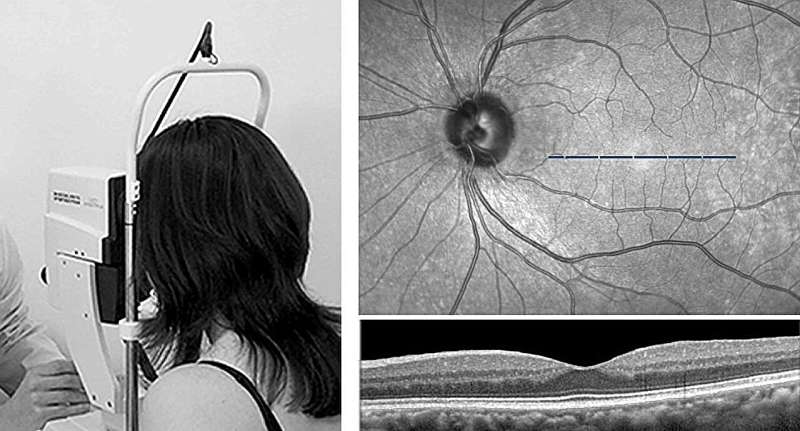This article has been reviewed according to Science X's editorial process and policies. Editors have highlighted the following attributes while ensuring the content's credibility:
fact-checked
peer-reviewed publication
trusted source
proofread
Analyzing the progression in retinal thickness could predict cognitive progression in Parkinson's patients

Although there are still some aspects pending confirmation for its use in the clinical setting, and its resolution needs to be improved slightly, a study by the UPV/EHU and Biobizkaia has shown that a method routinely used to carry out ophthalmological tests can also be used to monitor the neurodegeneration that occurs in Parkinson's patients. In the course of the research, it was found that the neurodegeneration of the retina probably precedes cognitive impairment.
When Parkinson's or another neurodegenerative disease is diagnosed, patients always ask, "And now what? What will happen? What can be expected from the disease?" For neurologists, however, it is not possible to answer these questions precisely, as "the evolution of patients tends to be very varied: some experience no change over the years, while others end up with dementia or in a wheelchair," explained Ane Murueta-Goyena, researcher in the UPV/EHU's department of Neurosciences.
Today, identifying Parkinson's patients at risk of cognitive impairment poses a major challenge, yet this is necessary when it comes to providing more effective clinical treatments and stepping up clinical trials.
In fact, Dr. Ane Murueta-Goyena, in collaboration with Biobizkaia's research staff, wanted to see "whether the visual system can enable this deterioration to be predicted, in other words, what future the patient can expect within a few years." The thickness of the retina was used for this purpose.
The retina is a membrane located at the back of the eyeball; it is related to the nervous system and comprises several layers. During the study, a cohort of Parkinson's patients had the thickness of the innermost layer of their retinas measured using optical coherence tomography.
This type of tomography is a routinely used instrument in ophthalmological tests, as it allows high-resolution, repeatable, and accurate measurements to be made. So the evolution of this retinal layer was analyzed and compared in people with and without Parkinson's disease over the 2015–2021 period. The results of the analysis of the images of the retinal layers of Parkinson's patients were also confirmed in a UK hospital.
The results showed that the retinal layer is noticeably thinner in Parkinson's patients. It was also observed that "during the initial phases of the disease it is in the retina where the greatest neurodegeneration is detected, and, from a given moment onwards, when the layer is already very thin, a kind of stabilizing of the neurodegeneration process takes place."
"Retinal thinning and cognitive impairment do not occur simultaneously. The initial changes in the retina are more evident and then, over the years, patients are observed to worsen clinically in both cognitive and motor terms," explained Murueta-Goya. "In other words, the slower retinal layer thickness loss is associated with faster cognitive decline; this slowness is linked to greater severity of the disease."
The researcher has attached great importance to the results. "We have obtained information on the progression of the disease, and the tool we are proposing is non-invasive and available at all hospitals."
The results need to be validated internationally, and "by slightly improving the resolution of the technology, we will be closer to validating the method for monitoring the neurodegeneration that takes place in Parkinson's disease." The researcher also revealed that they are continuing the research on another cohort of patients and that funding is the key.
The paper is published in the journal npj Parkinson's Disease.
More information: Ane Murueta-Goyena et al, Association of retinal neurodegeneration with the progression of cognitive decline in Parkinson's disease, npj Parkinson's Disease (2024). DOI: 10.1038/s41531-024-00637-x





















